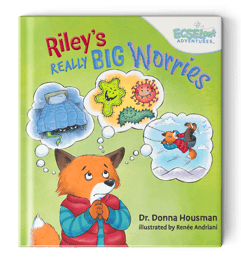
I recently spoke with Dr. Melissa Rampelli who writes for Psychology Today about the importance of bibliotherapy, or “the use of books as a form of treatment,” to improve emotional well being and mental health in children’s development. Melissa had seen Housman Institute’s work and cited the necessity of causal talk, conversations about emotions between adults and children, in supporting children’s development. Books play a key role in addressing emotions and opening-up communication about emotions in a safe, trusted and nurturing environment.
When Melissa and I spoke, we talked about my latest ECSELent Adventures book, Riley’s Really Big Worries. In this book, two of the beloved animal characters, Milo and Riley, share germs while playing on the swingset at school, creating a world of really big worries about icky germs for Riley when he gets a case of the “snuffleplox.”
Riley discusses his worries with his mother about the fact that germs are “everywhere,” and the book takes children through a story where Riley eventually addresses his anxiety by discussing it with his doctor during his doctor’s appointment and later his classmates. Riley also learns techniques for managing these big emotions: taking deep breaths, saying what the problem is, sharing how he feels, thinking of ideas, and coming up with a solution.
eventually addresses his anxiety by discussing it with his doctor during his doctor’s appointment and later his classmates. Riley also learns techniques for managing these big emotions: taking deep breaths, saying what the problem is, sharing how he feels, thinking of ideas, and coming up with a solution.
It’s normal for children to feel anxiety and worry. However, if not responsively and empathically addressed by adults, these worries can spiral out of control and interfere with a child’s well-being and daily activities.
Optimal development happens within the context of empathic, nurturing, and supportive relationships. Riley’s mom understands that Riley needs support in understanding and being better able to deal with his worries. His teachers understand that Riley is not alone with his worries and wisely introduce the topic of worries among all the children so each can find comfort in not feeling alone with their emotions and, more importantly, realize that there are ways to manage their big worries. Dr. Grayfoot clarifies information about germs and illness and shows how to empathically support the children in ways to stay healthy.
Children require modeling and guidance from trusted adults on how to manage their emotions, which is why books, such as Riley’s Really Big Worries, can be such useful tools as children are learning to identify and manage their emotions and understand those of others.
At the end of this book, I provide “Tips for Readers” that include open-ended questions intended to initiate conversations about the emotions in the book and the ways Riley, and other characters, learn to manage their worries and develop empathy as they also begin to understand those big emotions of their friends across their playspace.
By guiding children through these books about really big emotions, we’re using one more tool that can lead them on their path to emotional competence, helping to build a positive and secure sense of self, and a strong foundation for lifelong success.
Housman Institute, LLC
831 Beacon Street, Suite 407
Newton, MA 02459
info@housmaninstitute.org
(508)379-3012
Explore
Our Products
Legal
Connect
Contact
Join our Mailing List!
Subscribe to receive our newsletter, latest blogs, and ECSEL resources.
We respect and value your privacy.
Comments (4)